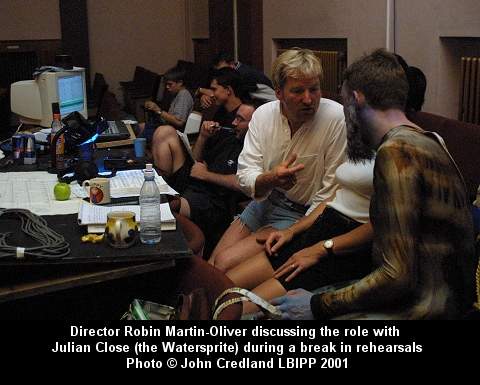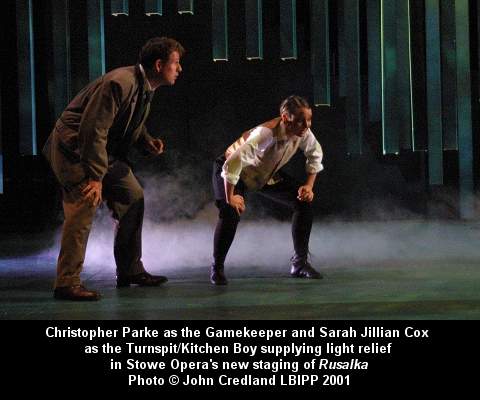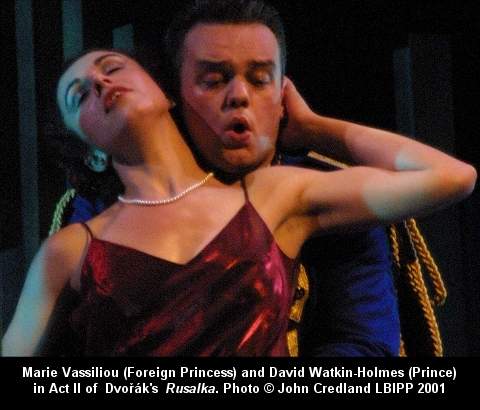|
<< -- 4 -- Roderic Dunnett MANY PLEASURES

Martin-Oliver's production does several very good things and some weak
ones. Too often -- even making allowance for the understandable pressure
of short rehearsal time -- performers fend for themselves. There is a lack
of planned gesture (which spares us futile ones, but leaves a hiatus). Jezibaba
(incessantly), but even Rusalka and her father too, are left to make half-moves
of no obvious relevance, or circling pirouettes that look merely like time-killers
and space-fillers. Singers require shaping, indeed positive nurturing
into move and gesture, more than actors : only the Turnspit and (to some
extent) the Princess were in actual control of their stance. The children
play inept, irritating pinching games around their pitcher frontstage, distracting
rather than adding.

Yet Act II runs as smooth as clockwork : the Turnspit acts his socks
off (Sarah Jillian Cox -- a girl-boy who actually moves like a boy;
compare the Royal Opera's recent Pfitzner Palestrina).

The guests process unaffectedly across the raised rearstage. There are
stylish principals' and chorus entries (the magical spring-cum-waterfall
having reverted to ceremonial steps : Dvorák serves up virtually
a whole Slavonic dance -- beautifully phrased by Secret and his players --
to welcome the court). The Prince and Princess's dalliances actually look
royal. And the 'frozen' slow courtly waltz, as the Water-Goblin answers
Rusalka's mid-festivity appeal is mesmerising. The last rencontre
between Prince and Rusalka, she poised on the steps, he ultimately doing
a slow death-cascade down the waterfall below her, was (almost visibly)
-- melting. If this standard were consistent, Stowe's thoughtful productions
would be positively stunning. They have many of the ingredients (and their
costuming is good too).

Flaws in the lighting (constant shadows on faces) and the serious lack
of surtitles certainly didn't help. The main complaint about each was the
lack of clarity -- affecting not just the visual but (crucially) intelligibility.
Not understanding the words reduces some parts to mime, or even pantomime
: we sense the outline characters; but who precisely, to those unversed
in fairy tale or Czech folklore, are the Woman in Red, the garrulous
serving staff, the circling fat lady? And what paradox persuades the Prince
to return to Rusalka? Dvorák's lines have it all; here, the narrative
often eluded, and ubiquitous darkness merely compounded the problem.
Continue >>
Copyright © 7 August 2001
Roderic Dunnett, Coventry, UK
 VISIT THE STOWE OPERA WEBSITE
<< Music
& Vision home
Rare Strauss >>
VISIT THE STOWE OPERA WEBSITE
<< Music
& Vision home
Rare Strauss >>
|

